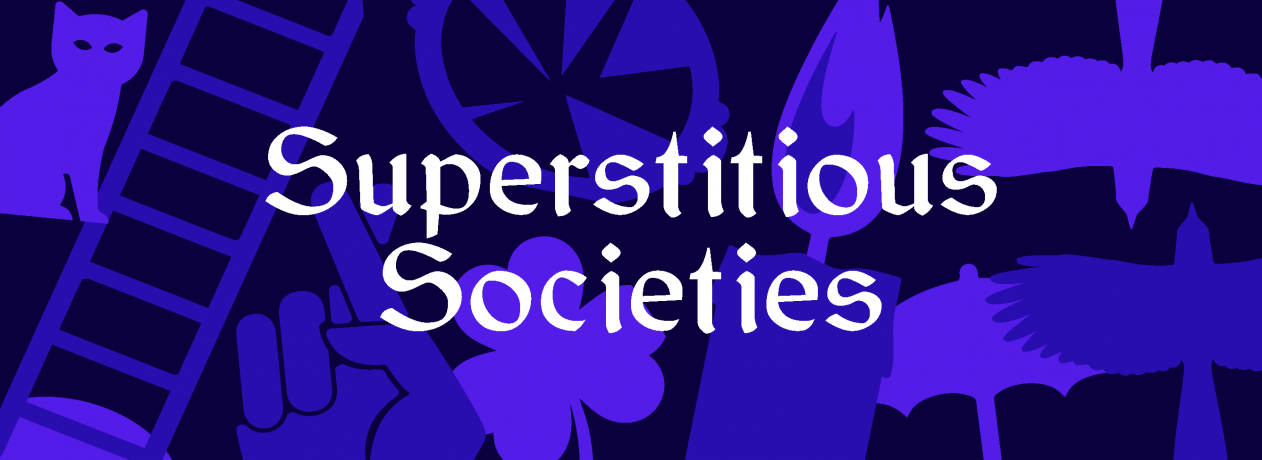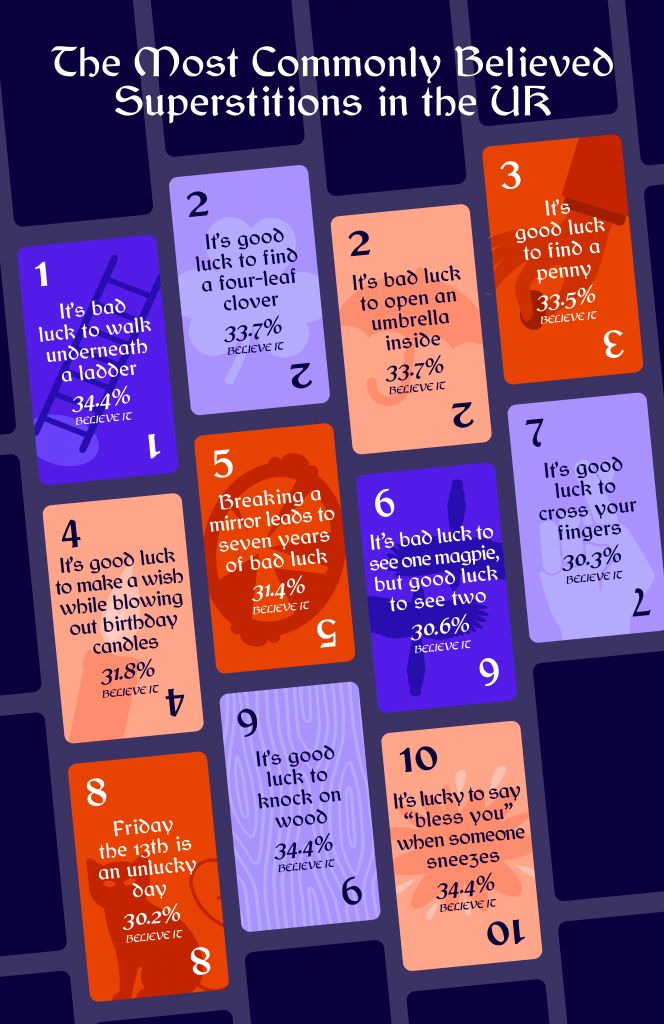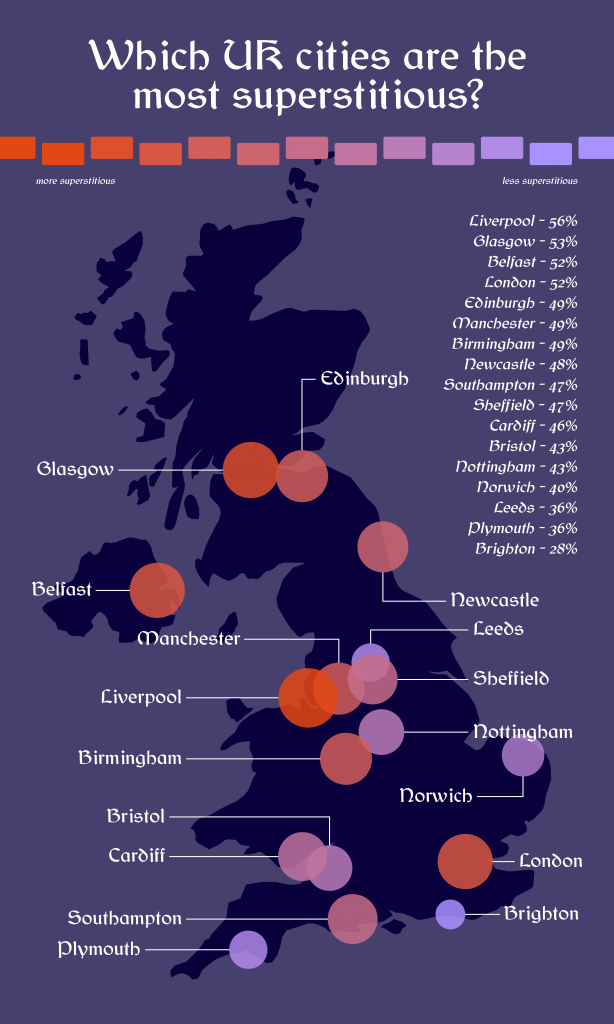As summer fades away and a chill starts to creep into the air, it can only mean one thing: spooky season is here. Halloween is just around the corner and with it comes a heightened sense of all things supernatural, especially as we approach the ominous Friday the 13th. Which got us wondering – in today’s age, which superstitions still strike fear (and hope) into the hearts of Brits around the country?
To discover the supernatural beliefs that still hold sway in the UK, we carried out an extensive survey of 1,500 Brits. From avoiding opening an umbrella indoors to making wishes on birthday candles, our bewitching research reveals all the fears and traditions that continue to shape our nation’s superstitious landscape.
The Most Widely Believed Superstitions
Nearly half (47%) of Brits we surveyed openly admitted to being superstitious, revealing a widespread fascination with supernatural influences. It seems superstitions weave a particularly compelling spell over the female population, with 54% of women embracing them compared to 41% of men.
The grip of superstition also seems to loosen as we age, with younger generations more likely to believe in them. A whopping 65% of 25 to 34-year-olds say they are superstitious, compared to only 35% of the over 55s.
For those who are superstitious, there are some beliefs that are more common than others. We asked Brits which superstitions they swear by, revealing the most widely-held beliefs in the country.
It’s bad luck to walk under a ladder
Topping the charts as the UK’s most widely believed superstition, with 34.4% of Brits firmly convinced of its truth, is the age-old belief that walking under a ladder brings bad luck. This peculiar superstition has deep historical roots that date back centuries, when the space under a ladder used to be considered a resting place for malevolent spirits due to their association with the gallows.
To avoid accidentally disturbing these spirits, people began to steer clear of walking under ladders as a protective measure. Over time, this cautionary custom evolved into a superstition that persists to this day.
44.1% of women are convinced walking under a ladder will bring them bad luck, compared to only 22% of men. The superstition is most commonly believed in Liverpool where 45% of people are sure of its truth, and least likely to be believed by people in Brighton (29%).
It’s lucky to find a four-leaf clover
The superstition that finding a four-leaf clover brings good luck comes in a close second, with over a third (33.7%) of Brits embracing the idea. It originates from ancient Celtic traditions, when Druids believed that these rare four-leafed clovers possessed mystical qualities, offering protection against evil forces and ensuring good fortune.
Women (43%) are again much more likely than men (21%) to believe this superstition, and it’s most popular of all in Sheffield where over half (56%) of residents think it’s true. On the opposite end of the spectrum, only 24% of Brighton residents believe in the power of the four-leaf clover.
Wherever in the country you are, the next time you spot a patch of clover, take a moment to peer closely; you may just stumble upon a bit of luck tucked away in those extra leaves.
It’s unlucky to open an umbrella inside
We’re no strangers to rain in the UK. Most Brits consider umbrellas to be an essential item – but over a third (33.7%) believe they should never be opened indoors for fear of inviting bad luck.
This is actually the most widely believed superstition among women, with 44.2% believing opening an umbrella inside is unlucky, while only 19.9% of men agree. Nearly half (49%) of people in Norwich share this superstition, while those in Plymouth are least likely to believe it (23%).
There are various theories about where this superstition comes from, including the idea that opening an umbrella indoors is an invitation for rain. If this is true, then it’s no wonder so many of us Brits are wary of it when we already have to deal with more than our fair share of wet weather.
Finding a penny is lucky
The lucky penny superstition stems from ancient civilizations, when people believed that metals were a gift from the gods that could provide protection from evil.
Although times have changed, it seems plenty of Brits still believe in the old saying, “Find a penny, pick it up, and all day long you’ll have good luck”. 33.5% of people we surveyed agree that finding a penny is lucky, with this figure jumping up to 42% among women. And despite only 23% of men saying they believe in it, this is actually the most widely believed superstition among them.
This belief is most widely accepted in Sheffield, with 52% of people convinced finding a penny will bring them fortune. Meanwhile, Brightonians are far less convinced, with none of the residents we surveyed here buying into the superstition.
It’s lucky to make a wish while blowing out birthday candles
The history of this charming superstition can be traced back to ancient Greece, where candles were used as offerings to Artemis, the goddess of the moon. It was believed that the smoke carried wishes and prayers to the heavens, invoking the favour of the gods. Over the centuries, this practice evolved into the familiar birthday ritual we know today.
Almost a third (31.8%) of Brits hold the belief that making a wish while blowing out birthday candles brings good fortune. Women (42%) are once again more likely than men (18%) to believe it, and it’s most popular of all among people in Plymouth (55%). On the other hand, only 18% of Cardiff residents buy into the lucky power of birthday candle wishes.
Breaking a mirror leads to seven years of bad luck
In Roman times, it was believed that the reflection in a mirror represented your soul, and shattering it would bring misfortune and harm. The notion of seven years of bad luck likely stems from the belief in the cyclical nature of life and the idea that it would take seven years for your soul to fully heal.
Though our understanding of mirrors and their significance has evolved, the supernatural belief surrounding their breakage remains, with 31.4% of Brits subscribing to this superstition. 40% of women acknowledge the curse of the broken mirror, while only 20% of men share this conviction.
Belfast residents are particularly prone to handling mirrors carefully with nearly half (48%) carrying this belief, while those in Newcastle are least convinced of its truth (22%).
The Least Widely Believed Superstitions
While some superstitions like walking under ladders and breaking mirrors are still common around the country, others are embraced by only a select few.
At the bottom of the list lies the belief that cutting your hair during a waxing moon brings good fortune, a notion held by only 2.8% of the population. The phases of the moon have been linked to various mystical practices throughout history, but this particular lunar hair custom remains relatively obscure.
Following behind is the superstition that catching falling leaves in autumn brings good luck, acknowledged by only 6.2% of people. The act of tucking money into the pockets of new clothes to invite good fortune comes next, upheld by just 6.5% of people. This is followed by the idea that white heather is lucky (8.8%) and that it’s lucky to say “white rabbits” three times on the first of the month (11%).
The Most Superstitious Cities in the UK
As well as revealing which superstitions still have the strongest grip on us overall, our survey also uncovered which areas of the country are most prone to holding superstitious beliefs.
Liverpool is officially the most superstitious city in the UK, with over half (55%) of people here saying they believe in superstitions. You’re especially likely to spot a Liverpudlian going out of their way to walk around a ladder instead of under it, as the most common superstition here is that walking beneath one brings bad luck (50%).
Glasgow ranks as the UK’s second-most superstitious city. 53% of Glasgwegians say they believe in superstitions, with the most common one being the notion that it’s unlucky to open an umbrella inside (40%). Belfast and London come in joint third (52%), followed by Edinburgh (49%).
Meanwhile, Brighton lands on the opposite end of the spectrum as the least superstitious city in the country, with only 28% of its inhabitants saying they are superstitious. This is followed by Plymouth (36%), Leeds (36%) and Norwich (40%).
The Most Superstitious Star Signs
Our survey revealed Leos as the most superstitious star sign, with well over half (58%) of them proudly declaring their belief in the supernatural. For these fiery individuals, it’s all about channelling their superstitions into moments of celebration, with 33% convinced that making a wish while blowing out birthday candles will bring them good luck.
Not far behind are Virgos, with 55% of them acknowledging their penchant for the supernatural. Their top superstition? 42% of Virgos steer clear of walking under ladders, convinced that it’s a one-way ticket to misfortune.
Geminis round out the top three most superstitious signs, with 53% of them embracing various superstitions. 36% consider finding a four-leaf clover a stroke of luck, making this their most commonly shared superstition. Perhaps it’s their innate curiosity and ability to see the world from multiple angles that make Geminis open to the idea that hidden treasures lie just beneath the surface of everyday life.
On the other hand, down-to-earth Capricorns are the least likely to have any supernatural beliefs, with just 37% admitting to being superstitious. This is followed by Pisces (40%), Aries (41%) and Libra (43%).
| Rank | Star Sign | Percentage of that star sign that are superstitious |
| 1 | Leo (23rd July – 22nd August) | 58% |
| 2 | Virgo (23rd August – 22nd September) | 55% |
| 3 | Gemini (21st May – 20th June) | 53% |
| 4 | Sagittarius (22nd November – 21st December) | 50% |
| Taurus (20th April – 20th May) | 50% | |
| 5 | Scorpio (23rd October – 21st November) | 47% |
| Cancer (21st June – 22nd July) | 47% | |
| 6 | Aquarius (21st January – 18th February) | 44% |
| 7 | Libra (23rd September – 22 October) | 43% |
| 8 | Aries (21st March – 19th April) | 41% |
| 9 | Pisces (19th February – 20th March) | 40% |
| 10 | Capricorn (22nd December – 20th January) | 37% |
Methodology and sources
All data was obtained from an independent survey of 1,500 general respondents in the UK, carried out in July 2023.




